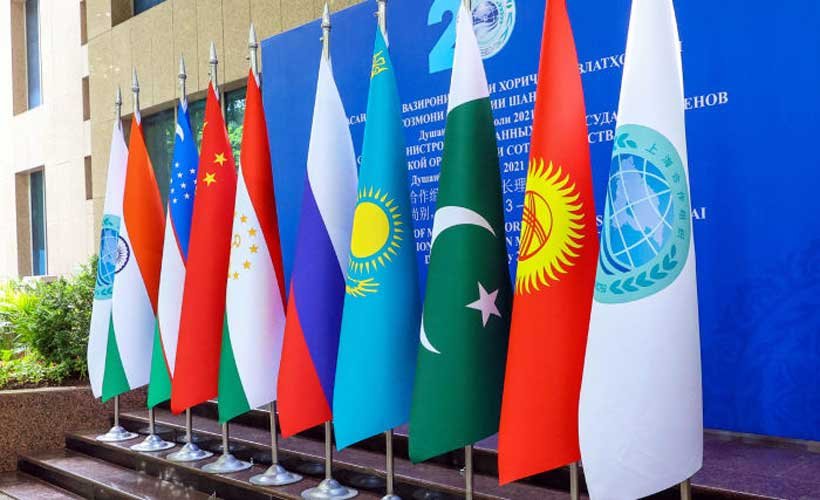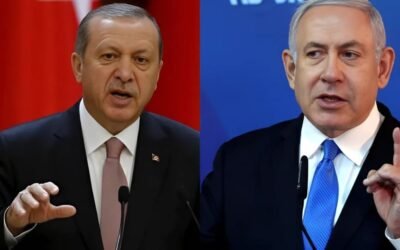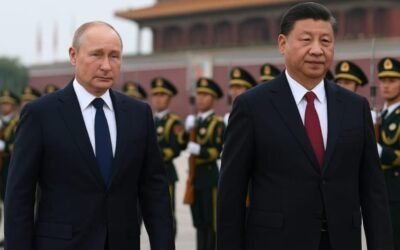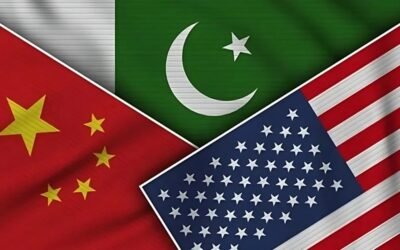The 25th summit of the SCO was held in Tianjin, China, on 25-26 June 2025. Since Pakistan and India became members of the Shanghai Cooperation Organisation in 2017, Pakistan has consistently used the SCO to promote its national interests. Pakistani diplomats and analysts claim that Islamabad now recognises the SCO as a significant source of regional cooperation and as a counterbalance to Indian influence. The official agenda of the organisation includes security, counter-terrorism, trade integration, and connectivity. Pakistan has promoted initiatives such as the CPEC as the SCO anchor, and officials in Shanghai emphasise that Pakistan will support regional transportation and energy networks this year. Pakistan highlighted its strategic position in regional trade and connectivity, focusing on expanding economic corridors through China, Afghanistan, and Iran. Minister Abdul Aleem Khan emphasised progress under CPEC and plans to enhance cross-border commerce via upgraded ports in Gwadar and Karachi.
Pakistan is prioritising regional connectivity and commerce at Tianjin 2025, emphasising its strategic location and the infrastructure developed through the China-Pakistan Economic Corridor (CPEC). In terms of transport and energy infrastructures, concerned officials and diplomats in Pakistan emphasised the intention of CPEC to be intertwined with the SCO free trade zone. Improved infrastructure in roads and ports (Gwadar and Karachi), smart transport, and a proposed Uzbekistan-Afghanistan-Pakistan railway are some of the projects that aim to strengthen the connections between South Asia and Central Asia.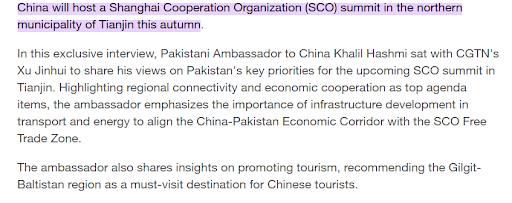
Pakistan has once again pledged to increase trade in the region by developing railway and air links through its foreign ministry and communications experts. They highlight changes such as the ability to be available yearly through the Khunjerab Pass and being part of the larger infrastructure cooperation initiatives within the SCO, shifting economic agenda now including digital economy, and facilitating cross-border trade.
The Shanghai Cooperation Organisation (SCO) advocates for solidarity in counter-terrorism and non-interference, promoting peaceful dialogue, but it does not take sides in internal conflicts within member countries. Such neutrality was challenged in 2025 when India conducted an attack within Pakistan following terror assaults in Kashmir, increasing tensions ahead of the Tianjin summit. The attack raised the issue of being included in SCO documents, and Pakistan objected, leading to stalemates in critical meetings. India boycotted the final communique of a June 26 meeting of defence ministers and left the room during the event, protesting the absence of a mention of Kashmir in the communique.
#WATCH | Delhi | MEA Spokesperson Randhir Jaiswal says, “…The Defence Minister participated in the defence ministers’ meeting of the SCO. This meeting happened over two days and has concluded. They could not adopt a joint statement. Certain member countries could not reach… pic.twitter.com/RVkNTREkLz
— ANI (@ANI) June 26, 2025
During the summit of leaders, the SCO reiterated its overall position on counter-terrorism and regional stability, without implicating any specific countries. India felt that the SCO was biased towards Pakistan, whereas Pakistan declared that the Kashmir episode was not an act of terrorism and that India was politicising the multilateral platforms. Although the Indian authorities have made indirect criticisms of Pakistan, the SCO has preferred to focus on the stance of dialogue and cooperation, as it seeks regional balance.
Pakistan actively counters Indian narratives within the SCO while strengthening ties with China and aligning with Central Asian members on shared security issues like terrorism. This approach helps Islamabad appear more cooperative. In contrast, India’s focus on accusing Pakistan over Kashmir is seen by others as a bilateral issue requiring direct dialogue. While Pakistan is open to SCO mediation, India continues to oppose third-party involvement in the Kashmir dispute.
In Tianjin, Pakistan positioned itself as a positive partner contributing to the achievements of common goals. Pakistani leaders utilise the rhetoric of SCO solidarity: they emphasise issues like terrorism, development, and stability that resonate with Central Asian members. In comparison, analysts observe that India’s policy, which aligns with its Western relations and its demands over Kashmir, has alienated certain SCO partners. Indian diplomats have complained that India no longer aligns with the developing anti-Western consensus among SCO members (particularly following Iran’s accession in April 2023). For example, both China and Russia condemned Israeli actions at the UN. India, however, chose not to support the move, as it had different priorities.
To conclude, the 2025 SCO summit emphasised Pakistan’s ongoing efforts to strengthen its position as a bridge between South-Central Asia. Islamabad received media attention for its trade initiatives and corridor agreements, and collaborated with China on technological projects. Meanwhile, the SCO’s official stance continued to express general support for counter-terrorism and multilateralism, without taking direct action in the Indo-Pak dispute. In the future, Pakistan’s role in the SCO will depend on its ability to maintain its reputation as a friendly member, with support from China and Russia. Several analysts note that if India had only marginal success within the SCO, this could provide Islamabad with a relatively louder voice in connectivity and economic forums.

